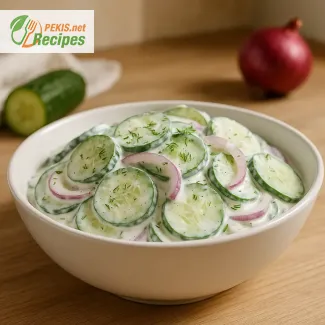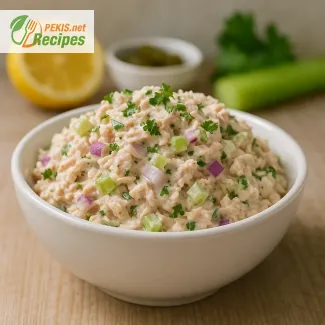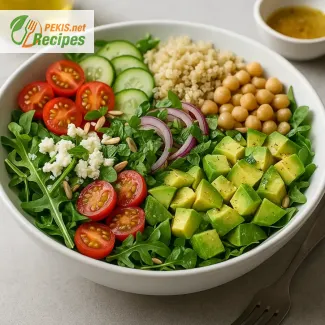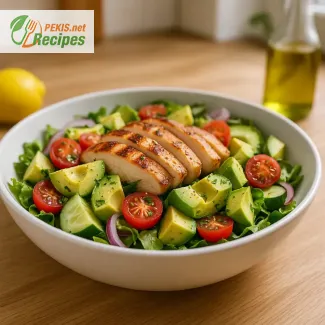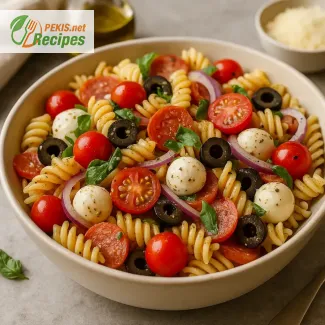
An avocado salad with shrimp is a refreshing and vibrant dish that combines the creamy richness of ripe avocados with the tender, succulent flavors of perfectly cooked shrimp. Each bite is a delightful balance of textures and tastes, creating a harmony of freshness and indulgence. The buttery avocado, known for its smooth and velvety texture, melts in the mouth, while the shrimp adds a delicate seafood flavor with a slight brininess, enhanced by the way it has been seasoned and cooked.
The salad is often elevated with bright, zesty citrus notes, such as lime or lemon, which not only cut through the richness of the avocado but also bring a tangy freshness that complements the shrimp beautifully. A hint of garlic or chili might be added to give a subtle kick, balancing the creamy and light seafood flavors. Fresh herbs like cilantro or parsley add a fragrant, earthy note, enhancing the overall taste while maintaining a light and refreshing feel.
The dish is typically served with a mix of crisp greens or other vibrant vegetables, such as cherry tomatoes or cucumber, adding a refreshing crunch that contrasts beautifully with the softness of the avocado and the shrimp. A drizzle of olive oil or a light vinaigrette might tie everything together, adding a glossy finish and a burst of flavor.
Avocado salad with shrimp is a perfect choice for those seeking a healthy, satisfying dish that feels indulgent yet light. It's ideal for summer lunches, dinner parties, or any occasion where fresh, clean flavors are celebrated. Whether enjoyed as a standalone meal or a part of a larger spread, this salad promises to be a highlight, delighting the senses with every bite.
- Prepare the shrimp:
In a medium-sized pan, heat 1 tablespoon of olive oil over medium heat. Season the shrimp with salt, pepper, and chili flakes (if using). Add the shrimp to the pan and cook for 2-3 minutes on each side, or until they turn pink and opaque. Set aside to cool slightly. - Prepare the vegetables:
While the shrimp cool, slice the avocados in half, remove the pits, and scoop out the flesh. Cut the avocado into bite-sized cubes and place them in a large salad bowl.
Dice the cucumber, halve the cherry tomatoes, and thinly slice the red onion. Add all the vegetables to the bowl with the avocado. - Dress the salad:
In a small bowl, whisk together the lime juice, minced garlic, and a pinch of salt and pepper. Pour the dressing over the salad and toss gently to combine, ensuring the avocado stays intact. - Assemble the salad:
Add the cooked shrimp to the salad mixture, tossing again gently. Finally, add the mixed salad greens and give the salad a final light toss. Garnish with fresh cilantro or parsley if desired. - Serve:
Divide the salad into 4 portions and serve immediately.
This avocado salad with shrimp is a deliciously light and healthy dish, packed with protein and good fats from the avocado. It’s perfect for a quick lunch or a refreshing dinner, especially during warmer weather. The bright flavors of the lime and the freshness of the vegetables make it ideal for any occasion!
The Avocado Salad with Shrimp provides a nutritious balance of healthy fats, protein, and a variety of vitamins and minerals that offer numerous health benefits. Let’s break down how the key ingredients and their nutritional values impact our body and overall health:
Avocado:
- Healthy Fats: Avocados are rich in monounsaturated fats, particularly oleic acid, which is heart-healthy and can help reduce bad cholesterol (LDL) levels while increasing good cholesterol (HDL). This contributes to cardiovascular health, reducing the risk of heart disease.
- Fiber: Avocados are also a good source of dietary fiber, with about 7g of fiber per serving in this recipe. Fiber aids digestion, promotes healthy gut bacteria, and helps maintain blood sugar levels, reducing the risk of developing type 2 diabetes.
- Vitamins and Minerals: They are packed with essential nutrients, including potassium (important for regulating blood pressure), vitamins K, E, and C (which support immune function and skin health), and folate (important for cell repair and development). Potassium, in particular, helps counteract the effects of sodium, supporting healthy blood pressure levels.
Shrimp:
- Lean Protein: Shrimp is an excellent source of lean, low-calorie protein, providing about 21g per serving in this dish. Protein is essential for building and repairing tissues, producing enzymes and hormones, and maintaining muscle mass, especially important in aging individuals or those on weight-loss regimens.
- Low in Calories: Despite being nutrient-dense, shrimp are relatively low in calories, making them a great option for those looking to maintain or lose weight without sacrificing nutrition.
- Omega-3 Fatty Acids: Shrimp contains small amounts of omega-3 fatty acids, which are beneficial for heart and brain health. Omega-3s help reduce inflammation in the body, improve brain function, and support eye health.
- Micronutrients: Shrimp is also rich in selenium (a powerful antioxidant that helps prevent cell damage) and iodine (essential for proper thyroid function).
Olive Oil:
- Heart-Healthy Fats: Like avocado, olive oil is rich in monounsaturated fats, specifically oleic acid. These fats have been shown to reduce inflammation and are associated with a lower risk of chronic diseases like heart disease.
- Antioxidants: Extra virgin olive oil, commonly used in salads, is rich in antioxidants, which protect cells from oxidative damage. It also contains anti-inflammatory compounds like oleocanthal, which mimic the effects of ibuprofen, potentially reducing chronic inflammation.
Cucumber and Salad Greens:
- Hydration and Low Calories: Cucumbers are primarily made up of water, making them excellent for hydration. They are also very low in calories, adding bulk to the salad without adding significant caloric load, which can aid in weight management.
- Vitamins and Antioxidants: Cucumber and salad greens, such as spinach or arugula, provide a variety of vitamins (like vitamin A, C, and K) and antioxidants, supporting immune function and skin health. They also contain compounds that may have anti-inflammatory and anti-cancer properties.
Cherry Tomatoes:
- Lycopene: Cherry tomatoes are an excellent source of lycopene, an antioxidant that gives them their red color and has been linked to a reduced risk of heart disease and certain cancers, especially prostate cancer. Lycopene also supports skin health, offering some protection against UV damage.
- Vitamin C: Tomatoes are rich in vitamin C, which helps boost immune function, aids in collagen production (important for skin elasticity), and enhances iron absorption from plant-based foods.
Lime Juice:
- Vitamin C: Limes are rich in vitamin C, which plays a key role in immune function and skin health by promoting collagen synthesis. It also helps the body absorb non-heme iron from plant-based foods, which is important for preventing anemia.
- Antioxidant Properties: The antioxidants in lime juice, like flavonoids, help fight free radicals in the body, reducing oxidative stress and the risk of chronic diseases.
Red Onion:
- Antioxidants and Quercetin: Red onions are rich in antioxidants and contain a flavonoid called quercetin, which has been shown to have anti-inflammatory, antiviral, and immune-boosting properties. Quercetin may help reduce blood pressure and promote heart health.
- Fiber: Onions also contain fiber, which promotes healthy digestion and can support weight management by making you feel full for longer periods.
Garlic:
- Antibacterial and Antiviral Properties: Garlic has been used for centuries for its medicinal properties. It contains allicin, a compound that has been shown to have antibacterial, antiviral, and antifungal effects, helping to boost immune function.
- Heart Health: Garlic may help lower blood pressure and cholesterol levels, contributing to improved cardiovascular health by reducing the risk of heart disease.
Impact on Health:
- Heart Health: The combination of heart-healthy fats from avocado and olive oil, lean protein from shrimp, and antioxidants from tomatoes and garlic supports cardiovascular health by improving cholesterol levels, reducing inflammation, and helping to maintain healthy blood pressure levels.
- Weight Management: The high fiber content from avocados, greens, and vegetables helps keep you feeling full longer, aiding in weight management. Shrimp provides high-quality protein, which is satiating without adding many calories.
- Anti-Inflammatory and Immune Support: The antioxidants in this salad, from lycopene in tomatoes, vitamin C in lime and avocado, and quercetin in onions, help fight oxidative stress and reduce inflammation in the body, supporting overall immune function.
- Skin Health: The vitamin C, vitamin E, and healthy fats in this dish contribute to healthy, glowing skin by promoting collagen production, protecting against UV damage, and keeping skin hydrated.
- Muscle Maintenance and Recovery: The lean protein from shrimp helps maintain muscle mass, essential for strength, metabolism, and recovery, especially after physical activity.
Overall, this Avocado Salad with Shrimp is not only delicious but also an excellent source of nutrients that can contribute to heart health, immune function, weight management, and overall well-being. It offers a balanced mix of macronutrients and micronutrients that promote long-term health while being light and refreshing.
Including a meal like Avocado Salad with Shrimp in your diet regularly can be highly beneficial due to its balanced nutritional profile. Ideally, this type of dish could be enjoyed once or twice a week as part of a varied diet, especially if you're aiming to maintain heart health, support weight management, or simply consume more nutrient-dense foods. The healthy fats, lean protein, and vibrant vegetables make it a light yet satisfying meal, perfect for lunch or dinner.
Nutritional advice:
- Balance with other meals: While this salad provides healthy fats and proteins, be sure to balance your overall diet with whole grains, lean meats, legumes, and a variety of fruits and vegetables to ensure you're getting a full spectrum of nutrients.
- Portion size: Though avocados and shrimp are nutrient-dense, they're also higher in calories and fat. If you're monitoring caloric intake, be mindful of portion sizes, especially when adding additional ingredients like olive oil.
- Substitutions: Feel free to modify this salad based on your dietary preferences. For example, you can swap shrimp for chicken or tofu for a different source of protein. You can also change up the vegetables to include seasonal produce for variety.
- Sustainability: Opt for sustainably sourced shrimp to reduce environmental impact. You can also consider organic or locally sourced vegetables for a more environmentally friendly option.
This dish is a fantastic choice for those seeking a health-conscious, flavorful meal, but it’s important to vary your diet to ensure all nutritional needs are met.

